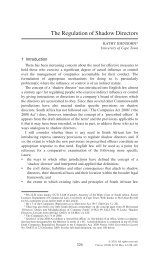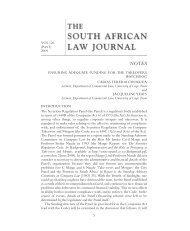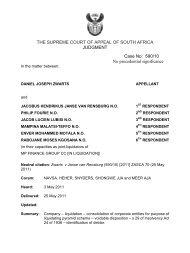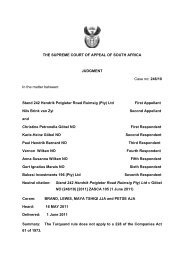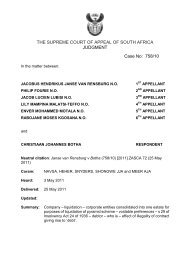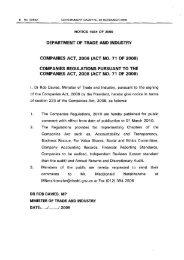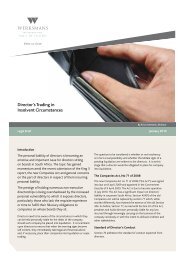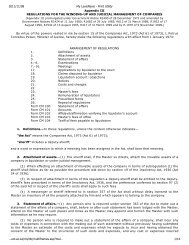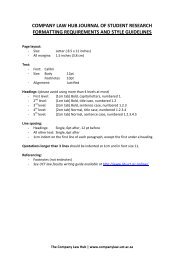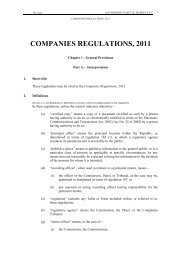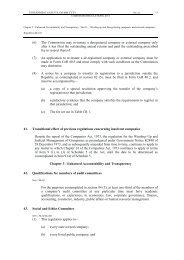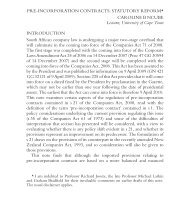Blue Square Advisory Services (Pty) Ltd v Mandingoane and Another
Blue Square Advisory Services (Pty) Ltd v Mandingoane and Another
Blue Square Advisory Services (Pty) Ltd v Mandingoane and Another
You also want an ePaper? Increase the reach of your titles
YUMPU automatically turns print PDFs into web optimized ePapers that Google loves.
Page 18<br />
<strong>Ltd</strong> <strong>and</strong> <strong>Another</strong> v Ocean Commodities Inc <strong>and</strong> Others 1983 (1) SA 276 (A) at<br />
289A-B. This policy is embodied in the provisions of section 104 of the 1973<br />
Act. In Pender v Lushington (1877) 6 Ch 70, the articles of association of the<br />
company provided that every member was to have one vote for every<br />
complete number of ten shares held with a voting limit that no shareholder<br />
shall be entitled to more than 100 votes. A beneficial shareholder interested in<br />
more than 1000 shares, with the object of increasing its voting powers,<br />
arranged for its shares to be held through nominees so as to be able to cast 649<br />
votes. The company rejected the votes <strong>and</strong> in proceedings by a member to<br />
restrain the rejection of votes, Jessel MR held the following at 77-78:<br />
“It appears to me that it is plain from the reading of these articles<br />
alone that the articles meant to refer to a registered member, but I think it is<br />
made, if possible, plainer – though I doubt whether it could be made plainer<br />
when you come to consider that it would not be possible to work the company<br />
in any other way, for how else could the company hold meetings or dem<strong>and</strong> a<br />
poll, or have the votes taken by scrutineers? – but if possible it is made plainer<br />
by the 19th article, which says: “The executors <strong>and</strong> administrators of a<br />
deceased member shall be the only persons recognised by the company as<br />
having any title to his share,” <strong>and</strong> also provides that “the company shall not be<br />
affected by notice of any trust.” And the 30th section of the Companies Act,<br />
1862 says: “No notice of any trust express, implied, or constructive, shall be<br />
entered on the register, or be receivable by the Registrar in the case of<br />
companies registered under this Act <strong>and</strong> registered in Engl<strong>and</strong> or Irel<strong>and</strong>.” It<br />
comes, therefore to this, that the register of shareholders, on which there can<br />
be no notice of trust, furnishing the only means of ascertaining whether you<br />
have a lawful meeting or a lawful dem<strong>and</strong> for a poll, or of enabling the<br />
scrutiny as to strike out votes.<br />
The result appears to be manifest, that the company has no right<br />
whatever to enter into the question of the beneficial ownership of the shares.<br />
Any such suggestion is quite inadmissible, <strong>and</strong> therefore it is clear that the<br />
chairman had no right to enquire who was the beneficial owner of the shares,<br />
<strong>and</strong> the votes in question ought to have been admitted as good votes<br />
independent of any enquiry as to whether the parties tendering them were or<br />
were not, <strong>and</strong> to what extent, trustees for other persons beneficially entitles to<br />
the shares.”<br />
[38] In Société Générale de Paris <strong>and</strong> <strong>Another</strong> v The Tramways Union<br />
Company, <strong>Ltd</strong>, <strong>and</strong> Others (1884-1885) 14 QB 424 (CA) Lindley, LJ said the<br />
following at pages 451-452:



